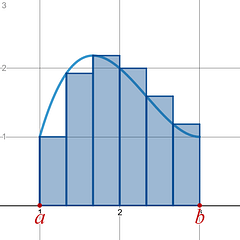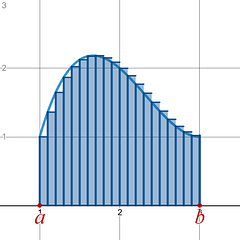Riemann Sums Become Definite Integrals
You start building the Fundamental Theorem of Calculus Part 2 by extending your Riemann Sum’s estimation of the net area between a curve and the x-axis ,to your Definite Integral’s exact net area between a curve and the x-axis .
Definition: Definite Integral
Given a function, , that is continuous on the x-interval [ a , b ], the definite integral is equal to a Riemann Sum that has been broken into an infinite number of subintervals,.
|
Riemann Sum vs. Integral |
||
|
Riemann Sum Uses shapes (usually rectangles, but could be any shape) to estimate the net area between a curve and the x-axis on a given x-interval [ a , b ].
In the example below the interval [1,3] was broken up into 6 subintervals,. As you can see there are always going to be some over and under estimates when using geometric shapes. What you inevitably get out is an estimate of the net area between a curve and the x-axis . |
Extension As you increase the number, n ,of subintervals over the same x-interval [ a , b ], you will see that your over and under estimates of the area between a curve and the x-axis become smaller, and the Riemann Sum continues to get more accurate.
|
Definite Integral Uses integration rules to find the exact net area between a curve and the x-axis on a given x-interval [ a , b ].
The Definite Integral, exact net area between a curve and the x-axis , applies a Limit to break up the x-interval [ a , b ] into an infinite number of subintervals, . Since each subinterval is as close to the next subintervals as it can possibly be, the , and you no longer have any over or under estimates , and get out an exact net area between a curve and the x-axis on a given x-interval [ a , b ]. |
|
|
|
|




